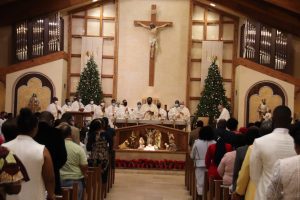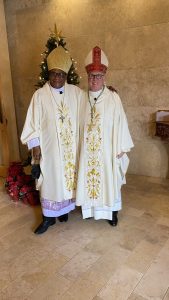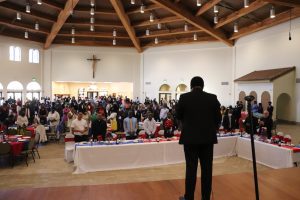On the 218th Anniversary of the first Independent Republic in the Caribbean in Haiti, the Diocese of Venice, in conjunction with the Haitian Catholic Community, celebrated a Mass at St. Leo the Great Parish in Bonita Springs on Jan. 1, the Solemnity of Mary, Holy Mother of God.
 Faithful people from throughout the Diocese of Venice attended the Mass which was celebrated by Most Rev. Pierre-André Dumas, Bishop of the Diocese of Anse-a-Veau and Miragoane, with Bishop Frank J. Dewane concelebrating. There were several additional priests from the Diocese of Venice who also concelebrated.
Faithful people from throughout the Diocese of Venice attended the Mass which was celebrated by Most Rev. Pierre-André Dumas, Bishop of the Diocese of Anse-a-Veau and Miragoane, with Bishop Frank J. Dewane concelebrating. There were several additional priests from the Diocese of Venice who also concelebrated.
Bishop Dumas spoke about the celebration of the independence of Haiti and how it importantly falls upon a major celebration of the Blessed Virgin Mary and the World Day of Peace. This is particularly poignant as in Haiti there has been great turmoil in recent months following the assassination of the Haitian president and continued unrest due to fuel and food shortages and corruption in the government.
Bishop Dumas encouraged those gathered regarding unity and fraternity as well as how they should be proud of their roots in Haiti, reminding them they will always be Haitian. With this in mind, Bishop Dumas encouraged everyone to keep a connection to their homeland as well as with their Faith which will serve them well in whatever obstacles they may face in the future.
 In a gesture of gratitude toward Bishop Dewane, Bishop Dumas noted that the Haitian Catholic Community within the Diocese of Venice is in good and capable hands and thanked Bishop Dewane for his support.
In a gesture of gratitude toward Bishop Dewane, Bishop Dumas noted that the Haitian Catholic Community within the Diocese of Venice is in good and capable hands and thanked Bishop Dewane for his support.
Bishop Dewane thanked Bishop Dumas for accepting his invitation to be a guest of the Diocese and for sharing his time, wisdom and faith with the Haitian Catholic Community in their native language. He also said it was an honor and privilege to participate in such an important cultural and religious celebration for the growing Haitian Catholic Community in the Diocese of Venice.
Bishop Dewane also thanked and recognized the Haitian priests serving in the Diocese for their continued dedication and passion for caring for the faithful, in particular those in the Haitian community. “The work you do does not go unnoticed,” the Bishop added. Further, he went on to thank St. Leo Parish for hosting the event.
There are currently Masses celebrated each weekend in Haitian Creole at the following Parishes: St. Charles Borromeo in Port Charlotte; St. Francis Xavier in Fort Myers; St. Michael in Wauchula; Sacred Heart in Bradenton; Our Lady of Guadalupe in Immokalee; and St. Peter the Apostle in Naples. The New Year’s Day celebration is one of the few times the entire community can gather in one place.
 For the Haitian community, Jan. 1 is both a spiritual day, and an emotional day commemorating such an important day in their homeland. The Haitians defeated the largest and most powerful army at the time, the army of Napoleon, in Cap-Haitien, and Haiti became the second country in the Americas to declare its Independence on Jan. 1, 1804.
For the Haitian community, Jan. 1 is both a spiritual day, and an emotional day commemorating such an important day in their homeland. The Haitians defeated the largest and most powerful army at the time, the army of Napoleon, in Cap-Haitien, and Haiti became the second country in the Americas to declare its Independence on Jan. 1, 1804.
When the French were in control, they enacted a law that said the French were the only ones who could eat soup joumou. Prior to that revolution, joumou was considered a delicacy and slaves there were forbidden from eating it. When Haiti proclaimed its independence, revolutionary leaders decided the very first thing they would do would be a symbolic gesture –- eating the soup that was once forbidden to them. Thus, began the Haitian custom of cooking and eating soup on New Year’s Day in celebration of freedom.
In honor of this unique tradition, soup was offered at the meal that followed the Mass in Bonita Springs. Before that meal, Bishop Dumas led everyone in singing the Haitian National Anthem.





